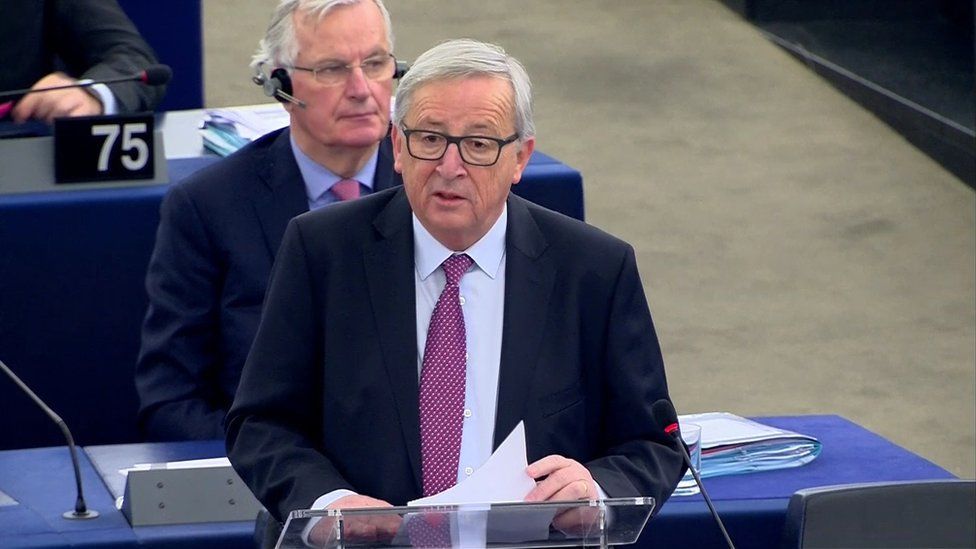EU pledge on post-Brexit cross-border peace funds
- Published

The President of the European Commission has indicated that funding for cross-border projects will continue after Brexit.
Jean-Claude Juncker said he could see "no more important use" of the European budget than maintaining the peace process in Ireland.
He was speaking at the European Parliament in Strasbourg on Wednesday.
Northern Ireland and the Republic of Ireland have benefitted from EU funding, particularly in border areas.
Over the years, millions of pounds have been received through Peace and Interreg projects to underpin the peace process.
The current peace funding stream is due to run until 2020.
Jean Claude Juncker told Members of the European Parliament (MEPs): "I see no more important use of our new budget than guaranteeing and financing the peace process in Ireland.
"This is an unconditional European commitment.
"This is what the commission will deliver with our proposal for the next multiannual financial framework in May."
That could mean a fresh round of peace funding from 2020 until at least 2025.
Allow Twitter content?
This article contains content provided by Twitter. We ask for your permission before anything is loaded, as they may be using cookies and other technologies. You may want to read Twitter’s cookie policy, external and privacy policy, external before accepting. To view this content choose ‘accept and continue’.
DUP MEP Diane Dodds tweeted her support for his comments, calling it a "positive" move.
'No backsliding on border'
Mr Juncker's commitment followed a speech by Irish prime minister Leo Varadkar who said there can be no "backsliding" on the Irish border agreement between the EU and the UK.
The breakthrough in the Brexit talks in December saw the UK agreeing that, whatever its future relationship with the EU, there will be no hard border.
Mr Varadkar thanked MEPs for their solidarity as the EU works to ensure "what has been promised is delivered".
He said he respected the outcome of the Brexit vote.
But also speaking at the European Parliament, Mr Varadkar reminded MEPs that the majority of people in Northern Ireland had voted to remain in the EU.
He added that he hoped the future UK-EU relationship will be "as close and deep as possible and consistent with the need for the EU to protect our internal market and the customs union".
He repeated his view that it is likely the majority of people living in Northern Ireland would remain European citizens after Brexit, due to their "unique status" as dual Irish/British citizens under the terms of the Good Friday Agreement.
Mr Varadkar also addressed the issue of corporate taxation, which is a source of tension between the Republic of Ireland and other member states.
He said it was his "strong view" that corporations should pay their fair share of tax and that Ireland had already taken steps to close loopholes in its tax laws.
However, he rejected the idea that the EU should take unilateral action on tax, saying this should be done on an international basis through the OECD.
'European Ideal'
The taoiseach said Ireland was open to contributing more to the EU budget after Brexit, but "only if it is spent on things that contribute to the advancement of the European ideal".
He said budgets for the Common Agricultural Policy (CAP) and Interreg cross-border projects should be protected.
Mr Varadkar also used his speech to pay tribute to the former SDLP leader John Hume who was an MEP for 25 years.
Allow Twitter content?
This article contains content provided by Twitter. We ask for your permission before anything is loaded, as they may be using cookies and other technologies. You may want to read Twitter’s cookie policy, external and privacy policy, external before accepting. To view this content choose ‘accept and continue’.
He told the parliament that Mr Hume was "one of the greatest figures in Irish politics" who saw the EU as "a model and a vision for how a lasting peace, however improbable, could be fostered and built".
Mr Juncker's comments were welcomed by Gina McIntyre, the chief executive of the Special European Union Programmes Body (SEUPB).
"This underlines the importance and significance that EU funding has had in positively transforming the lives of hundreds of thousands of people across the region," she said.
"This funding continues to support cross-community peace and reconciliation activities as well as cross-border development in a range of sectors including health and social care, environmental protection, economic development and sustainable transport."
- Published8 December 2017
- Published8 December 2017
- Published9 December 2017